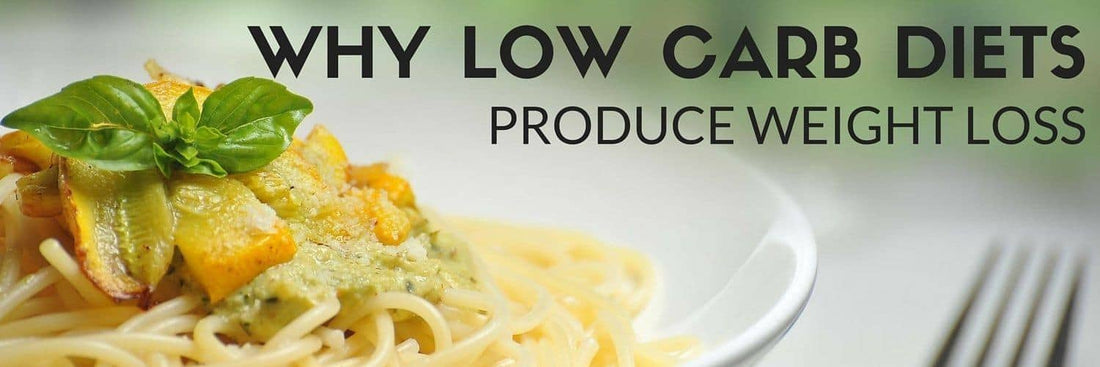Have you ever wondered why low-carb diets are so effective?
Are you always trying to follow this dietary trend, but are afraid of substitutions or don’t know where to start?
Well I’m here to clear up all of your questions!
Today I’m going to explain to you the science behind the benefits of a low-carb diet, what you should be eating instead, and the best way to get started!
All About Low-Carb Diets

It has become common knowledge that low carb diets = weight loss, however some people remain afraid to try these diets due to the replacement of carbohydrates with other substances – namely fats.
We’ve been told since we were young that fat makes you fat, and low fat diets are good. This is understandable considering the fact that if fat is what we’re so afraid of, why would we consume that very substance itself.
Science however, has advanced well beyond this notion and come to recognize that the human body is way more complex than we once imagined. Due to the immense amount of reactions and transformations that occur during metabolic digestion, conclusions such as “eating fat equals storing fat” have been recognized as overly-simplistic – even archaic – mechanistic theories.
Today I’m going to briefly explain why it is that solely reducing carbohydrate content in your diet can produce weight loss, and why you shouldn’t fear substituting your carbohydrates with other ingredients.
Why do Carbohydrates Produce Weight Gain?
The reason carbohydrate consumption results in weight gain is due to the fact that insulin promotes the storage of adipose (fat) tissue.
When individuals consume carbohydrates, total blood sugar levels increase, and therefore provokes a compensatory spike in insulin secretion in order to bring blood sugar levels back under control. This is especially true for simple carbohydrates with a high glycemic load. When this spike occurs, insulin is able to promote the storage of adipose tissue, thus resulting in an overall increase in your fat content1,2.

If however, you eat a meal that contains very minor amounts of sugar, and does not cause an insulin spike, such as a low-carb, high fat meal, the components of the meal are actually used up for other bodily processes rather than being stored as fat, thereby providing you with more stable energy levels and reduced storage of body fat. Make sense?

High carbohydrate diets also act as a double-edged sword, as the increase in blood sugar following a meal is typically followed by a dip in blood sugar. This results in peaks and trough of energy throughout the day, and consequently, reduced energy quality and cravings for carbohydrates to rebalance blood sugar during dips. This will generally cause you to reach for poor-quality snacks which only make the cycle worse.
Overall, the result is both increased food consumption and increased fat storage.
Benefits of Reducing Carbohydrate Consumption
Reducing carbohydrates in your diet can produce a myriad of results, including everything from weight loss to increased energy and focus.

Eating meals that are high in vegetables, fats and proteins is an effective way of preventing dips in blood sugar to prevent cravings and overeating , while concurrently preventing insulin spikes, therefore negating adipose storage3,4. Additionally, this way of eating will keep you feeling full while effectively providing you with stable energy throughout the day.
Increased energy, decreased appetite, decreased fat storage. Sounds like a WIN-WIN-WIN in my books.
How to Get Started on a Low-Carb Lifestyle
Now that you understand the reasons behind the benefits of a low-carb diet, I’m sure you’re probably wondering where to get started.
So, I’m going to give you a few great tips and recipes you can use to get started on implementing a low-carb lifestyle.
1. Benefits occur in a spectrum – I’ve had many clients who desire to change their eating habits, but when you’ve been eating a certain way for a long time, this can be challenging. It’s important to remember that the benefits of reducing dietary carbohydrates occurs in a spectrum. It’s not as black-and-white as eating sugary cereal all day vs. eating no carbohydrates what-so-ever, and if you’re just starting out, a gradual reduction will be efficacious in producing desirable results while simultaneously easing the transition to a low-carb lifestyle.
2. Consider Carbohydrate Quality – Not all carbs are equal, and carbohydrates with a higher glycemic load (as opposed to index) are responsible for more drastic increases in blood sugar. This produces more dramatic peaks and troughs in blood sugar, and therefore increases the severity of the negative symptoms such as cravings and low energy that you experience. If you’re just starting out on a low-carb lifestyle, note that the most significant targets for making an initial change are eliminating refined carbohydrates and those with a high glycemic load5,6.

3. Consume carbohydrates in the evening – Again, this may be contradictory to what you once heard. In my pre-nutrition days I read a lot about only consuming carbs in the morning, not consuming carbs after lunch or they’ll get stored as fat, etc. It’s true, you shouldn’t be consuming anything right before bed, however as long as you’re eating your final meal at a reasonable distance before bed, this myth couldn’t be further from the truth.Consuming a high-carbohydrate meal in the morning actually sets your blood sugar up for spikes and dips throughout the day. During the dips you’re at risk of overeating, which will promote the persistence of this cycle throughout the day. If however, you stick to low-carb, high vegetable, high fat, high protein meals throughout the day, you completely negate these issues, and can actually keep your body in a stable energy state throughout the day. If you reserve enjoying a reasonable amount and quality of carbohydrates until dinner, your blood sugar has all evening and night to rebalance itself, and this method has actually shown to improve control of appetite and blood sugar the following day7,8,9.
4. Don’t be afraid of fat – As I discussed earlier, it has become an archaic notion that eating fat is responsible for making you fat. In fact, it has now been demonstrated that there was no evidence from randomized controlled trials supporting the introduction of governmental guidelines for a low-fat diet in the UK and USA10. As far as scientists are concerned, this essentially means that the entire nation’s eating habits over the last 40 years were based on nothing.In reality, fat is actually a great energy source that promotes feelings of fullness throughout the day, tastes great, and when eaten in moderation and in the absence of high carbohydrate foods, will not promote fat storage on its own.
5. Find recipes that mimic old favourites – When first embarking upon a dietary transition, it can be tough to give up the foods you love. Pancakes, cakes and pies were some of my favourites! So a great way to ease the transition is to find foods that mimic old favourites in order to fill any carbohydrate voids! Two of my personal favourites are my Grain-Free Chocolate Pancakes with Whipped Cream and Grain-Free, Sugar-Free Apple Pie. Give them a try to find out what you won’t be missing!

Now that you have all of the tips, tools and recipes you need to get started, try it out during your next work week and pay attention to your energy levels, cravings, and even how your clothes fit! Let me know how it goes in the comments below ☺
To your better health,
Anita Tee
MSc, Personalized Nutrition; BSc, Genetic & Molecular Biology
Personal Training Specialist, Canadian Register of Exercise & Fitness Professionals
References
1. Montague CO’Rahilly S. The Perils of Portliness: Causes and Consequences of Visceral Adiposity. Diabetes. 2000;49(6):883-888.
2. Guilherme A, Virbasius J, Puri V, Czech M. Adipocyte dysfunctions linking obesity to insulin resistance and type 2 diabetes. Nature Reviews Molecular Cell Biology. 2008;9(5):367-377.
3. Tay J, Luscombe-Marsh N, Thompson C, Noakes M, Buckley J, Wittert G et al. Comparison of low- and high-carbohydrate diets for type 2 diabetes management: a randomized trial. American Journal of Clinical Nutrition. 2015;102(4):780-790.
4. Nielsen Joensson E. Low-carbohydrate diet in type 2 diabetes: stable improvement of bodyweight and glycemic control during 44 months follow-up. Nutrition & Metabolism. 2008;5(1):14.
5. Brand-Miller J, Hayne S, Petocz P, Colagiuri S. Low-Glycemic Index Diets in the Management of Diabetes: A meta-analysis of randomized controlled trials. Diabetes Care. 2003;26(8):2261-2267.
6. Wylie-Rosett J, Segal-Isaacson C, Segal-Isaacson A. Carbohydrates and Increases in Obesity: Does the Type of Carbohydrate Make a Difference?. Obesity Research. 2004;12(S11):124S-129S.
7. Nilsson A, Östman E, Holst J, Björck I. Including Indigestible Carbohydrates in the Evening Meal of Healthy Subjects Improves Glucose Tolerance, Lowers Inflammatory Markers, and Increases Satiety after a Subsequent Standardized Breakfast. The Journal of Nutrition [Internet]. 2008 [cited 13 May 2016];138(4):732-739. Available from: https://jn.nutrition.org/content/138/4/732.full
8. Nilsson A, Granfeldt Y, Östman E, Preston T, Björck I. Effects of GI and content of indigestible carbohydrates of cereal-based evening meals on glucose tolerance at a subsequent standardised breakfast. European Journal of Clinical Nutrition. 2006;60(9):1092-1099.
9. Nilsson A, Ostman E, Knudsen K, Holst J, Bjorck I. A Cereal-Based Evening Meal Rich in Indigestible Carbohydrates Increases Plasma Butyrate the Next Morning. Journal of Nutrition. 2010;140(11):1932-1936.
10. Bahl R. The evidence base for fat guidelines: a balanced diet. Open Heart. 2015;2(1):e000229-e000229.

Anita Tee
My name is Anita Tee. I'm a nutritional scientist who specializes in histamine intolerance. I hold a Master of Science in Personalized Nutrition and a Bachelor of Science in Human Biology and Psychology.For the past ten years, I have used my experience in nutritional and medical health sciences to create a scientifically backed, natural approach to healthcare that relies 100% on evidence-based research.As I previously suffered from - and overcame - histamine intolerance, my focus is to increase recognition and expand the available resources and protocols available for resolving this particular disorder. To date, I have helped over 4,000 individuals fully resolve or better manage their histamine intolerance symptoms.







